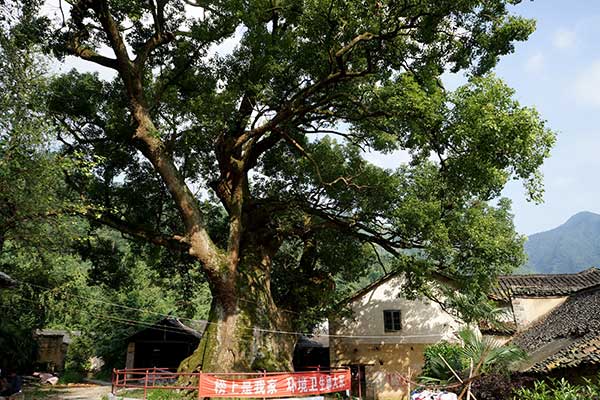Old glory paves way for new adventure
 0 Comment(s)
0 Comment(s) Print
Print E-mail China Daily, August 19, 2015
E-mail China Daily, August 19, 2015
|
A camphor tree in Mochuan township is believed to be more than 1,000 years old.[Photo by Huo Yan/China Daily] |
Thirteen generations later, Chen Jun's descendent Chen Kechang grew to be the richest merchant of the area, selling local products such as tea, animal skin and Chinese wood oil. He invested in real estate, buying up 200 hectares of land.
That wealth is more evident in the man's tomb than in the homestead. While the compound for the living is tucked away in a labyrinth with narrow walkways, the compound for the deceased looks more like a mausoleum, occupying an expanse of flat land and facing distant peaks to the south. Giant stone statues-of humans and animals-flank the wide entranceway. The burial mound itself is covered with memorial columns and carvings, befitting a local king. Unsurprisingly, a structure of such grandeur was endorsed by the emperor when it was built in 1889. Otherwise it would have been seen as subversive or power hungry. The person who commissioned it was Chen Kechang's grandson, who had risen up the ladder of officialdom through the imperial examination system. After his grandfather passed away, he gave up his position and applied to the imperial court for a posthumous title for his grandfather.
The grandson, Chen Bingyi, was one of three people from Mochuan who excelled in the national-level imperial exam. There were also 16 boys from the village who passed the province-level exam. The emphasis on education was so great that the name of the village was changed from Lotus Pond to Bangshang, meaning "to get on the list of successful candidates for the exam". Mochuan was recently named among China's historical and cultural towns and villages by the Ministry of Housing and Urban-Rural Development.







